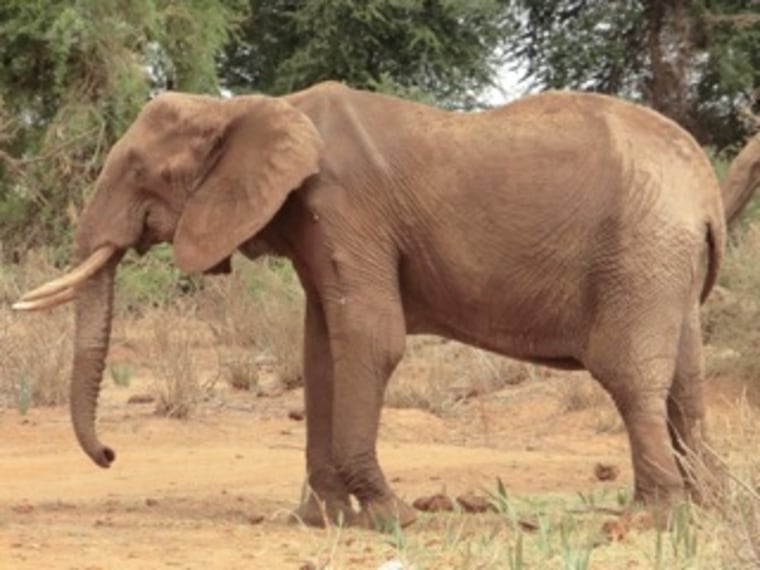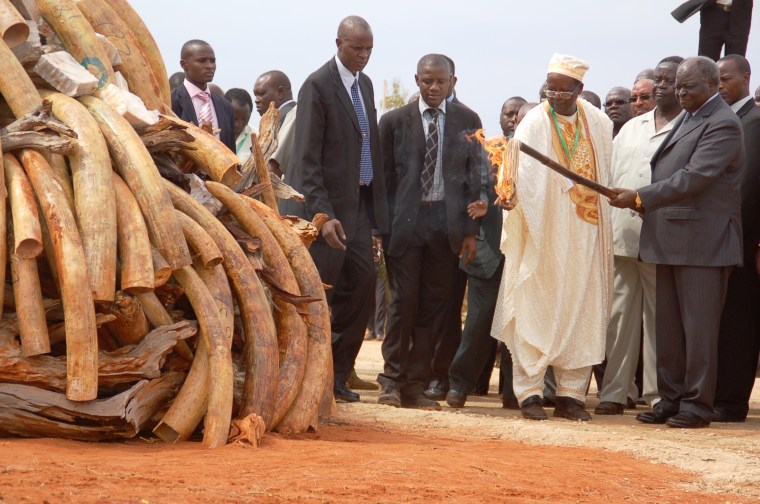Record prices for ivory are fueling a sharp increase in poachers killing elephants, even those in protected areas, conservation groups warned Wednesday — the same day that Kenyan President Mwai Kibaki burned five tons of confiscated ivory to highlight the problem.
"We wish to firmly demonstrate to the world our determination to eliminate all forms of illegal trade in ivory," Kibaki told the crowd, before lighting the 335 tusks. "Poachers and illegal trades in ivory must know that their days are numbered."
"Let the fire shine a spotlight on this growing crisis and motivate us to take action against the bloody ivory trade," Shelley Waterland of the Born Free Foundation said in a statement. "No more sales of stockpiled ivory; no more tusks sold for a staggering $1,500 a kilo (2.2 pounds); no more rangers and wardens killed by poachers trying to protect wild elephants; no more ivory orphans."
"Right now there's been a flare-up in illegal killings that we haven't seen in 20 years," added Iain Douglas-Hamilton, founder of Save the Elephants, as he watched the pile burn. "Over the past two and half years the price of ivory has gone up crazily, evidently fuelled by demand from the far east."
With the price of ivory doubling in just two years, the killing last week of a matriarch elephant named Khadija added to the urgency raised by activists.
Slaughtered near Kenya's Samburu National Reserve, Khadija left eight orphans — "a story that is becoming way too familiar in northern Kenya," Save the Elephants said in a statement.
"Ironically, Khadija had been treated two weeks earlier for bullet wounds and had survived the attack," the group added. "This time, she died as she hobbled near the river, with four fresh bullets in her body. By midnight, under the full moon, her tusks had been cut out and the
(radio) collar she was wearing had been destroyed and buried in the sand."

Poaching in and around Samburu is so severe that the entire population is threatened. "The
number of mature males has consistently declined and mortality has impacted over half of the
family units," Save the Elephants stated. "Fourteen percent of the social groups do not contain a breeding female over the age of 25 years and are comprised of multiple orphan calves. With many of the large bulls poached, the elephant population is now so skewed that 70 percent of the population is female."
"Samburu has been a success story where elephants have been recovering from the excessive poaching of the 1970s and 1980s right up until 2008," said Douglas-Hamilton. "It has been one of Africa's few safe havens for elephants thanks to" enforcement by the Kenya Wildlife Service. "However, the new poaching spike, driven by new demand, is threatening one of the most peaceful elephant populations in Africa with highly habituated, trusting animals."
Save the Elephants placed some of the blame on Kenya itself. "Unfortunately, whenever an arrest is made, the sentence carried out by the Kenyan government tends to be minimal and poachers are often back 'in the bush' within 48 hours," it stated.
Born Free estimates that 35,000 elephants are killed each year for their ivory across Africa, some 15 percent of the total population.
Activists say a 1989 ban on trading ivory is no longer effective because of loopholes.
"Poaching is now so bad because that life-saving ban has been eroded by 'one-off' sales and the development of trading mechanisms, both of which send entirely the wrong message to poaching networks and the organized crime syndicates that operate them," said Waterland.
Born Free urged regulators to reimpose a full trading ban and "withdraw 'approved ivory trading nation' status from China and Japan," nations that receive illegal ivory shipments for use in carvings and traditional medicines.
